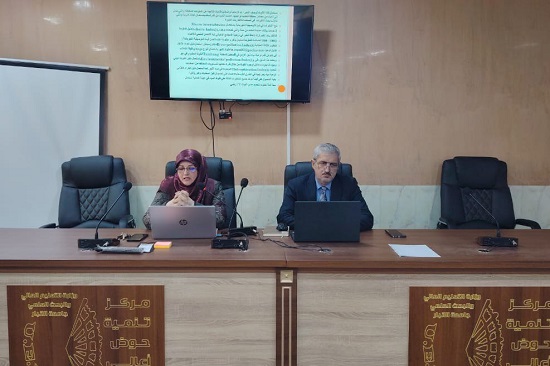| News Details |
Workshop on Bio indicators (Pollution Detectors)
2025-02-08

The Upper Euphrates Center for Sustainable Development Research, in cooperation with the Continuing Education Center at the Presidency of the University of Anbar, held a workshop tagged: Bio indicator (pollution detectors) on Tuesday, 4/2/2025, at the central hall of the center, which was presented by:
- Assoc. Prof. Muthanna Badie Farhan.
- Assoc. Prof. Dr. Hala Arshad Ali.
The workshop dealt with a vital and important topic regarding environmental pollution in different environments water, soil and air. It also focused on several axes, the most important of which was the impact of these pollutants on the environmental and health aspects, by clarifying the most important indicators through which it can be inferred that there is pollution that can cause health damage to humans and animals, and reference has been made to the bacterial evidence through which it is possible to infer the presence of fecal polution of water, which is an indicator that pollution can cause or be pathogenic bacteria are the cause of various diseases as a result of the use of people such as This contaminated water, which is originally derived from human feces, and the most important of these bacterial signs are:
1- Coliform bacteria in general and Escherichia coli in particular.
2- Fecal Streptococci.
3- Bacteria (Clostridum perfringens Cl. welchii).
4- Bacteria (Pseudomonas aeruginosa).
It is also possible to infer from the presence of some other bacterial species that the sources of pollution may come from animals or industrial waste, and therefore through these vital indicators we can infer the source of pollution for the purpose of treating it and preventing its expansion and causing health damage to humans and animals as well as to living organisms living in water.
At the end of the workshop, several questions and inquiries were raised by the attendees, as well as the Director of the Center, Prof. Dr. Ammar Hatem Kamel, called for the possibility of holding a seminar on this vital and important topic of human and animal health in the presence of officials of the relevant departments in the governorate to spread the benefit and the possibility of applying what was put forward during this workshop of tests for these vital signs to achieve the goals of sustainable development in good health, well-being, clean water and hygiene.
#Upper_Euphrates_Center_for_Sustainable_Development_Research









